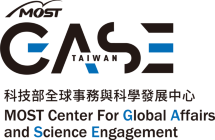
International students welcomed at GASE’s 2019 thematic summer camp.Credit: Center for Global Affairs and Science Engagement
In the middle of 2019, 34 outstanding scholars from more than 10 countries gathered in Taiwan to learn about latest breakthroughs in quantum technology and AI. They also had a chance to experience Taiwan’s unique culture. This annual summer programme was organized by the Center for Global Affairs and Science Engagement (GASE) to offer talented students opportunities to gain insights into Taiwan’s technological development through lectures, laboratory tours, and corporate visits.
Funded by Taiwan’s Ministry of Science and Technology (MOST), GASE is operated by National Taiwan University (NTU) in cooperation with National Taiwan Normal University and National Taiwan University of Science and Technology. By providing a platform for exchange between Taiwanese researchers and their partners abroad, GASE plays a critical role in facilitating Taiwan’s research presence. With 15 university members on the steering committee, it aims to facilitate global partnerships for Taiwan’s universities and research organizations.
“From climate change, to threats to public health, the world is facing complex problems,” said the director of GASE, Hsiao-Wei Yuan. “And these challenges can only be addressed if we collaborate with partners around the world.” Publication data suggests, Taiwan is performing strongly in areas including electrical engineering, medicine, biotechnology, and chemical engineering, bolstered by its efforts in strengthening collaborations.

The 2019 Global Science and Technology Leaders Forum gathered more than 40 science and technology leaders from 23 prominent institutions in 18 countries, along with 300 officials and delegates from Taiwan and abroad.Credit: Center for Global Affairs and Science Engagement
GASE also hosted the 2019 Global Science and Technology Leaders Forum, held in Taipei in celebration of MOST’s 60th anniversary. The forum highlighted Taiwan’s science and technology development, and invited speakers from 23 prominent institutions in 18 countries, along with around 300 officials and delegates.
GASE’s 15 committee member universities presented their research results at the exhibition session. Technologies on display include: a camera drone designed by NTU researchers, capable of generating high-resolution images and transmitting them in real-time, allowing accurate wildlife monitoring; an Intelligent Factory Automation (iFA) system promoted by National Cheng Kung University, which provides solutions for next-generation manufacturing; an intelligent robot arm system by National Dong Hwa University, linking the Internet of Things, cloud services, green energy, and communications technologies to refine and integrate industrial processes; and AI-enabled image classification technology that enables early detection of melanoma, developed by DermAI, a startup incubated by Taipei Medical University. National Tsing Hua University featured a novel high-entropy alloy with diverse applications beyond traditional material; and National Sun Yat-sen University demonstrated multi-functional smart films that can adjust light transmission by remote control.
Events such as this Forum help build a network for global connections. The 2020 summer programme, will feature green technology and AI as its main theme, and welcomes students from around the world. “We are dedicated to becoming the bridge between Taiwan and the global research community, especially for young researchers.” said Yuan. “Our role is to create smart strategies in this small economy and expand them throughout the world.”


